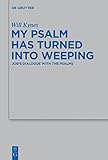My Psalm Has Turned into Weeping : Job's Dialogue with the Psalms / Will Kynes.
Material type: TextSeries: Beihefte zur Zeitschrift für die alttestamentliche Wissenschaft ; 437Publisher: Berlin ; Boston : De Gruyter, [2012]Copyright date: ©2012Description: 1 online resource (230 p.)Content type:
TextSeries: Beihefte zur Zeitschrift für die alttestamentliche Wissenschaft ; 437Publisher: Berlin ; Boston : De Gruyter, [2012]Copyright date: ©2012Description: 1 online resource (230 p.)Content type: - 9783110294811
- 9783110294941
- BS1415.52
- online - DeGruyter
- Issued also in print.
| Item type | Current library | Call number | URL | Status | Notes | Barcode | |
|---|---|---|---|---|---|---|---|
 eBook
eBook
|
Biblioteca "Angelicum" Pont. Univ. S.Tommaso d'Aquino Nuvola online | online - DeGruyter (Browse shelf(Opens below)) | Online access | Not for loan (Accesso limitato) | Accesso per gli utenti autorizzati / Access for authorized users | (dgr)9783110294941 |
Frontmatter -- Acknowledgements -- Table of Contents -- Abbreviations -- 1. Hearing History: Connections between Job and the Psalms in the History of Interpretation -- 2. Between Times, Between Texts: Intertextualities in Dialogue -- Part I. Praise -- 3. Hubris and Humility: Psalm 8 in Job -- 4. Doxology in Disputation: Psalm 107 in Job -- Part II. Supplication -- 5. Ominous Omniscience?: Psalm 139 in Job -- 6. Harassed Hope: Psalm 39 in Job -- Part III. Instruction -- 7. From Didactic to Dialogic: Psalm 1 in Job -- 8. Re-interpreting Retribution: Psalm 73 in Job -- 9. Conclusion -- Bibliography -- Index of Ancient Sources -- Index of Subjects -- Index of Authors
restricted access online access with authorization star
http://purl.org/coar/access_right/c_16ec
Drawing inspiration from the widely recognized parody of Ps 8:5 in Job 7:17–18, this study inquires whether other allusions to the Psalms might likewise contribute to the dialogue between Job, his friends, and God. An intertextual method that incorporates both “diachronic” and “synchronic” concerns is applied to the sections of Job and the Psalms in which the intertextual connections are the most pronounced, the Job dialogue and six psalms that fall into three broad categories: praise (8, 107), supplication (39, 139), and instruction (1, 73). In each case, Job’s dependence on the Psalms is determined to be the more likely explanation of the parallel, and, in most, allusions to the same psalm appear in the speeches of both Job and the friends. The contrasting uses to which they put these psalms reflect conflicting interpretive approaches and uncover latent tensions within them by capitalizing on their ambiguities. They also provide historical insight into the Psalms’ authority and developing views of retribution. The dialogue created between Job and these psalms indicates the concern the book has with the proper response to suffering and the role the interpretation of authoritative texts may play in that reaction.
Issued also in print.
Mode of access: Internet via World Wide Web.
In English.
Description based on online resource; title from PDF title page (publisher's Web site, viewed 28. Feb 2023)


